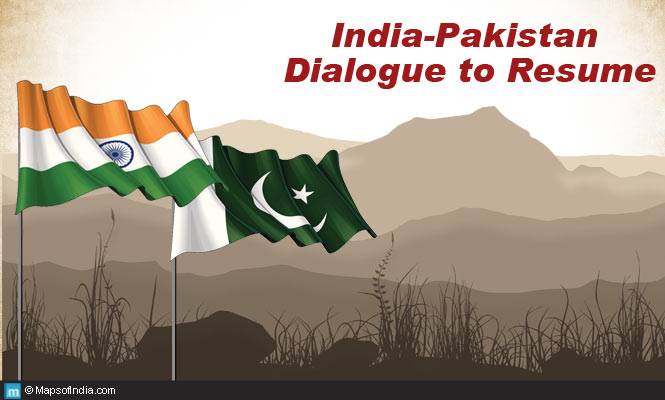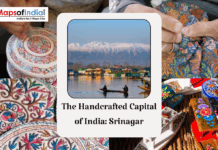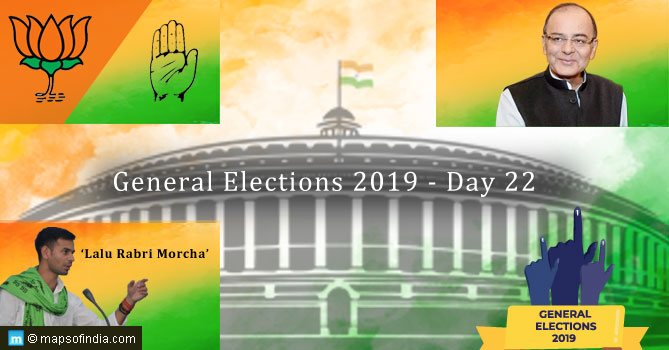 It is a development that surprised even a hardcore pessimist. No one had expected that Prime Minister Narendra Modi, who rejected pleas from several quarters to resume talks with Islamabad, would himself pick up phone to say hello to Pakistan Prime Minister Nawaz Sharif and wish his cricket team luck ahead of the World Cup match between the archrivals on 15 February. It was not all. The Prime Minister also informed his Pakistani counterpart that he was sending newly appointed Foreign Secretary S Jaishankar to Islamabad. It signalled New Delhi’s attempt to bring a thaw in the frosty relations between two nations, that have not held any dialogue since foreign-secretary level talks were called off on 25 August, 2014.
It is a development that surprised even a hardcore pessimist. No one had expected that Prime Minister Narendra Modi, who rejected pleas from several quarters to resume talks with Islamabad, would himself pick up phone to say hello to Pakistan Prime Minister Nawaz Sharif and wish his cricket team luck ahead of the World Cup match between the archrivals on 15 February. It was not all. The Prime Minister also informed his Pakistani counterpart that he was sending newly appointed Foreign Secretary S Jaishankar to Islamabad. It signalled New Delhi’s attempt to bring a thaw in the frosty relations between two nations, that have not held any dialogue since foreign-secretary level talks were called off on 25 August, 2014.
Why this sudden change of heart?
There is a speculation that this change of opinion in India towards Pakistan might have come following Pakistan’s former National Security Adviser Mahmud Durrani’s recently concluded visit. Seen as the one who enjoys close rapport with Pakistan’s top military leadership including Army Chief Raheel Sharif, Durrani is said to have held several high-level meetings prior to the visit. With this, it was speculated that Durrani might have come here armed with messages from the Pakistani Army that they would support any move by Islamabad on talks with India. It became apparent after Durrani held talks with NSA Ajit Doval and Foreign Secretary Jaishankar, he hinted that Modi might “engage with Pakistan”. However, announcement of such probability was not the outcome of this back channel diplomatic engagement alone. Behind-the-scene talks between the two sides were going on for the past few months. NSA Ajit Doval and Pakistan High Commissioner Abdul Basit had held several rounds of meetings between them.
In October 2014, ex-envoys and prominent members of the civil society from India and Pakistan held talks in Dubai on ways to deal with the fallout of terror strike in India with support from Pakistan’s state and non-state actors. They also tried to explore ways on how to keep the dialogue process on. Even businessmen from the both sides of the fence had delved deep into the hurdles affecting bilateral economic relations. But signs of thaw in relations became visible after the Peshawar attack. Shocked at the dastardly incident, Modi spoke to the Pakistan Prime Minister over phone and offered his “deepest condolences” on the killing of school children by terrorists belonging to the banned Tehreek-e-Pakistan Taliban. NSA Doval visited Pakistan High Commission to pen down his anguish in the condolence book. “India is solidly behind the people and government of Pakistan, will do everything possible to help them counter the menace of terrorism,” Doval had emphasised.
Does India want Pakistan to toe its line?
All these issues had also figured during Modi-Obama talks in New Delhi. It is believed that the latter wanted India to resume dialogue with Pakistan. At the recently concluded heads of mission conclave, strengthening of relationship with neighbours was discussed and it was felt that stability and development in the region would not be possible without engaging with Pakistan. The PM’s decision to send the foreign secretary to Pakistan and other SAARC nations is to be seen in this backdrop. At a recent get-together with the journalists in the national capital, Jaishankar expressed his keenness to visit Pakistan and make it clear that India was ready for the resumption of dialogue provided it is not based on the old format. New Delhi does not want Kashmir-based Hurriyat party to be a stakeholder in the India-Pakistan dialogue. It wants footprint of terrorism to be removed from the region, and for this Pakistan is required to act decisively.
India wants Kashmir to be resolved through bilateral mechanism alone. According to critics, the NDA government should not send a high-ranking official to Pakistan since the latter has not committed to work in consonance with India’s sentiment. They point out the fact that Pakistan continues to violate ceasefire; it has not put the trial of 26/11 accused on fast track and it has hardly acted against Hafiz Saeed, the Lashkar-e-Taiba founder and mastermind of the 2008 Mumbai attack who continues to rant anti-India statements in public. Moreover, at a time when India is showing flexibility in its attitude towards Islamabad, Pakistani leadership is trying hard to rub against India’s interest. Pakistan criticised India’s proposed membership to the 48-member Nuclear Suppliers Group. “Pakistan is opposed to yet another country-specific exemption from NSG rules to grant membership to India, as this would further compound the already fragile strategic stability environment in South Asia,” Sartaz Aziz, Pakistan’s national security adviser had said in a statement. As if it was not enough, PM Nawaz Sharif in his conversation with US President bluntly said, “India does not deserve to be a permanent member of the UN Security Council.” For him, India’s permanent membership in the reformed UN Security Council was unacceptable since it had not complied with UN resolutions on Kashmir.
In the face of blatant anti-India stand, strategic affairs experts denounce the NDA government’s approach towards Pakistan. They are of the opinion that the Modi government is committing the same mistake which Manmohan Singh-led UPA did. But MEA officials maintain that in diplomacy there is no full stop to anything and “possibility is always there in India-Pakistan engagement.” Perhaps, in search of this possibility, foreign secretary Jaishankar will undertake a visit to Pakistan either at the end of February or March. As Pakistan is hosting next SAARC summit, some say that the visit is being undertaken so that by the time Modi visits Pakistan for the annual regional conclave, ruffled up feathers between the two sides get smoothened.
Read More:
Kashmir Solidarity Day: Facts You Must Know
Can The Kashmir Issue Be Ever Resolved Through Peace Talks?
How Can India Benefit From Becoming a Member of SCO?
Why India And Pakistan Were Separated ?
India-Pakistan Relations: Is Spring Around the Corner?
India Pakistan Border Dispute
Pakistan: Intensifying Anti-India Agenda
India-Pakistan tension on borders
Is India changing the course of engagement with Pakistan?
India worries: Chinese troops training Pakistan army
India’s 10 Most Wanted Men
India’s foreign trade – Rising beyond mere relations
Bilateral Issues India Needs To Resolve
Neighbouring Countries of india





